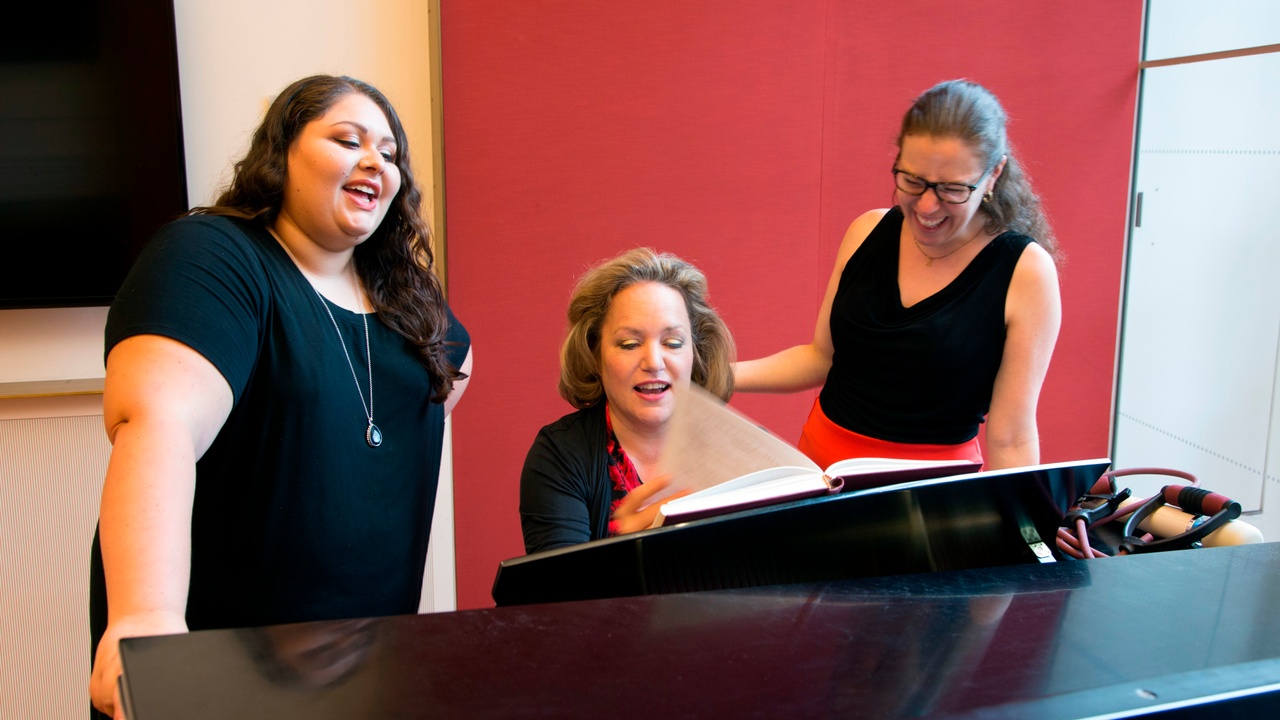What Do You Need from Your Voice Teacher?
Mar 14, 2022

Some years ago I became aware that within our vast and varied constellation of voice teachers, I was regarded as a technique specialist.
When I asked a prospective student why they were interested in working with me, they often replied with something like, “I‘ve heard you're great at teaching technique, and I really need to get my technique together,” followed by a caveat along the lines of, “I learned so much from Professor Famoso at Conservatorio Stretto, I‘m incredibly grateful to them! but they didn't really teach technique.”
I would think, “if they aren‘t teaching technique, then what the hell are they teaching?”
I would also occasionally receive an SOS from a singer currently enrolled in a conservatory program who urgently needed help their Official Voice Teacher was unable to provide: to resolve habitual tongue tension, or even out their registration, or develop the breath coordination to navigate long phrases. By the time they reached out to me, they were clearly at the end of their rope, because otherwise they would never commit such an egregious act of betrayal.
And I would think, “if there‘s a skill their teacher doesn‘t know how to teach well, why don‘t they just refer this student to someone who does teach it well, or improve their own skill in the area?”
I am certainly not the only voice teacher who teaches technique, who offers effective strategies for tongue release, registration, breath management, and so on. However, it would be a very good idea to inquire whether music school voice faculties feature teachers who “don’t really teach technique,” who don't know how to teach the complete skill set singers need, and who are unwilling to either expand their skill set or refer students to other teachers when necessary.

What does a singer really need from a voice teacher? This is a question that I constantly ask myself, and the answer continually evolves. This is how I would answer that question today.
First, only the singer really knows what they need. It’s what motivated them to seek instruction, even if they themselves aren’t consciously aware of what they are looking for. And it has to everything to do with personal creativity, expression, and empowerment, and only somewhat to do with the “so that‘s”:
-
So that I can get into a good school
-
So that I can land a gig
-
So that I can meet the conductor’s expectations
By the time they get to my studio, they may additionally be burdened with some really toxic “so that’s”:
-
So that I can stop sucking
-
So that I can fix these awful problems I’ve always had
-
So that I will someday be worthy of affirmation from the industry
So when I consider what a singer needs from me, part of that answer is often that they need my help to clear all of the so-that’s out of their head, in order for them to get back in touch with what it is that they really need for themselves, the internal source of motivation and imagination that only they can know about. Because without that, the rest of the so-that’s won’t matter. Without something passionate to say, supported by the confidence and determination to say it, all the vocal and audition technique in the world won't get them anywhere.
A singer who is in touch with what they really need, though, also knows to some extent what they need from a voice teacher. And they will tell me, and they will frame it in terms of what they want and need:
-
I want to improve my articulation
-
I want to even out my registration
-
I want to improve my breath coordination
And then it’s my job to provide the instruction and resources that will give them what they want and need.
It’s also my job to tell them if I can’t. If what they want and need is help with Czech lyric diction, Baroque ornamentation, or an audition with a prominent conductor, those are all good examples of things I can’t help them with. It’s my job to be transparent about that, and if possible, point them in a direction where they can get help with those things.
But when a singer shows up with a laundry list of so-that’s, while perhaps also not feeling all that in touch with their own creative impulses, and they think it’s the teacher’s job to help them with the so-that’s, and the teacher thinks it’s their job to prioritize the so-that’s, and the teacher thinks they know better than the singer about things like how they should sound, what they should already be capable of, how they should look (god forbid), then there is next to no chance of that teacher helping that singer to get what they really need.
When this happens within the context of a performance training or degree program, the singer stands even less chance of getting what they need if it is in direct conflict with what the teacher needs:
-
To make sure their students sing impressive juries
-
To make sure their students are assigned leading roles in school productions
-
To impress their supervisors or tenure committee members
-
To bask in their successful students’ reflected glory
-
To avoid feeling like an imposter should it be discovered that they don’t know absolutely everything
Whatever a singer may need from a voice teacher, they’ll only really get it if that need is expressed by them, the singer. There is a very big difference between the act of singing a high note when it comes from the depths of your soul, and singing a high note “so that”—so that you can do what the composer said to, so that you can assure yourself or someone else that you are the right kind of soprano to sing this role, so that you can impress the jury or audition panel, etc.
One thing it’s easy for me to be transparent about is that I can’t help you sing a high note that you aren’t genuinely motivated to sing. The technique only helps if the will to sing it is there. If you have the will to sing it, I can help you with the rest.
 My second book, The Singer's Audition & Career Handbook, was released just prior to the pandemic. Just in time to be the thing no one would need throughout two years of no live auditions, and zero opportunity for conventional career development. I decided to defer publicizing the book until audition and career preparation were once again on everyone's minds.
My second book, The Singer's Audition & Career Handbook, was released just prior to the pandemic. Just in time to be the thing no one would need throughout two years of no live auditions, and zero opportunity for conventional career development. I decided to defer publicizing the book until audition and career preparation were once again on everyone's minds.

That time has now arrived, so I gave my own book another read. I’m still very proud of most of the content, and I believe that classical singers will find it quite useful for navigating training programs and the opera industry. There are some aspects of the book that haven’t aged all that well, e.g. over the course of the pandemic singers have become accustomed to using backing tracks to create demo videos, which would previously have been considered disqualifying by many. I also sense in some passages an unconscious, internalized classist bias that I have since been striving to make conscious and to purge, but will alas remain enshrined in the published pages.
But what I am most struck by is realizing just how hard I was trying to prepare my readers to compensate for the kind of misinformation and neglect that I, and so many of my peers, endured throughout our training.
Page 8:
“The process of charting an effective course to vocal mastery and career success begins with a detailed, candid assessment of your strengths and weaknesses, followed by a plan to perfect and balance out your skills. No one else will do this for you—not your voice department, your studio teacher, your coaches, or your manager.”
Translation:
I trusted that the MM program at the elite conservatory that accepted me with a substantial scholarship was committed to helping me achieve professional viability, but I discovered that there were significant gaps in their curriculum. Make sure this doesn’t also happen to you.
Pages 31-32:
“On some level I must have known all along that my singing was poorly coordinated, that my range and phrasing was far too limited, and producing my sound unnecessarily effortful… I have since come to understand that it is not uncommon for singers to discover that their technique is in poor shape while they’re in the midst of graduate studies.”
Translation:
I was accepted into grad school with killer potential but little technique, and my teachers in grad school “didn't really teach technique.” Make sure this doesn’t also happen to you.
So there you go, I guess that’s me finally marketing my book. If it is your dream to pursue an opera career, good graduate programs and YAPs remain your best path. Just please read this book first, so that you know what you’re getting yourself into. I didn’t write it for status or for the lunch money my annual royalty check provides, I wrote it for you, or rather I wrote it for the singer I was when I was in your situation.
What you really need from your teachers and your institutions is support for what you already know you need to become the artist you dream of becoming.
Don’t let any of us try to tell you that we know better than you do.


